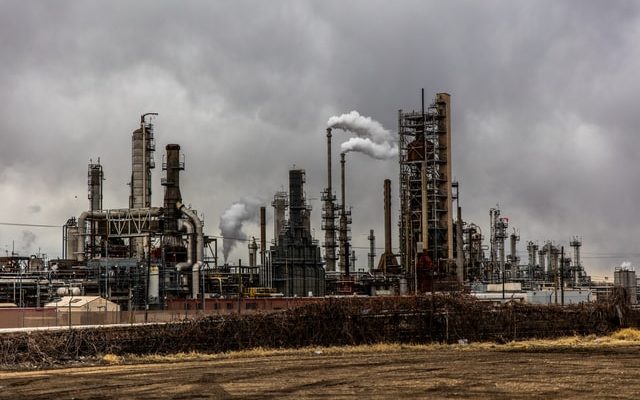Oil and Gas Industry. Image credit: Unsplash Patrick Hendry
Canada is aiming to cut emissions across all sectors by 40 to 45 percent from 2005 levels by 2030 by using use an industry-specific cap-and-trade system or a modified carbon pricing system to set a ceiling for emissions from the oil and gas sector.
Canada’s Environment Minister Steven Guilbeault will reportedly publish a discussion paper on Monday containing two options to highlight how the Liberals expect to implement the oil and gas emissions cap promised in last year’s election.
During a House of Commons committee meeting in April studying the proposed emissions cap on oil and gas, Guilbeault was reported to say that the oil and gas sector is Canada’s biggest emitter.
The first proposed option involves a new cap-and-trade system on the oil and gas sector in isolation.
The second option would modify the industrial carbon price already applied to the oil and gas sector, possibly by hiking the price itself if needed.
In 2020 Canada’s oil and gas sector accounted for 179 million tonnes.
Options to manage the cap will be accepted until Sept. 30 with Guilbeault aiming to unveil the final plan early in 2023.
Most of Canada’s oil and gas producers are already cutting emissions due to other regulations and a desire to become a cleaner, more competitive option for global customers.
The Pathways Alliance, with six of the biggest oilsands companies on board, is aiming to get emissions to net zero by 2050, mainly through carbon capture and storage projects that trap greenhouse gases before they go into the atmosphere and then store them back underground.
Mark Cameron, a vice-president with the Pathways Alliance, says it has its own ambitious targets for the oilsands which can be practically and economically achieved by 2030 by balancing ambition with realism.
Cameron is concerned that Ottawa’s options outlined in the discussion paper on tackling climate change, might set the bar too high and too soon and could lead to shutting in production.
Richard Masson, the executive fellow at the University of Calgary’s School of Public Policy, chairing the World Petroleum Council in Canada was reported to saying that an investment of many billions of dollars would be needed to get to these goals.
Alberta’s energy and environment ministers said after reviewing the federal government’s paper, that they would support affordable solutions that are developed through meaningful consultation.
“Alberta will not accept any plan from the federal government that seeks to interfere in our constitutionally protected ability to develop our resources,” the statement has said.
“Provinces are the owners of these natural resources, which have been responsibly managed on behalf of Canadians for decades.”
#OilAndGAs; #Emissions





